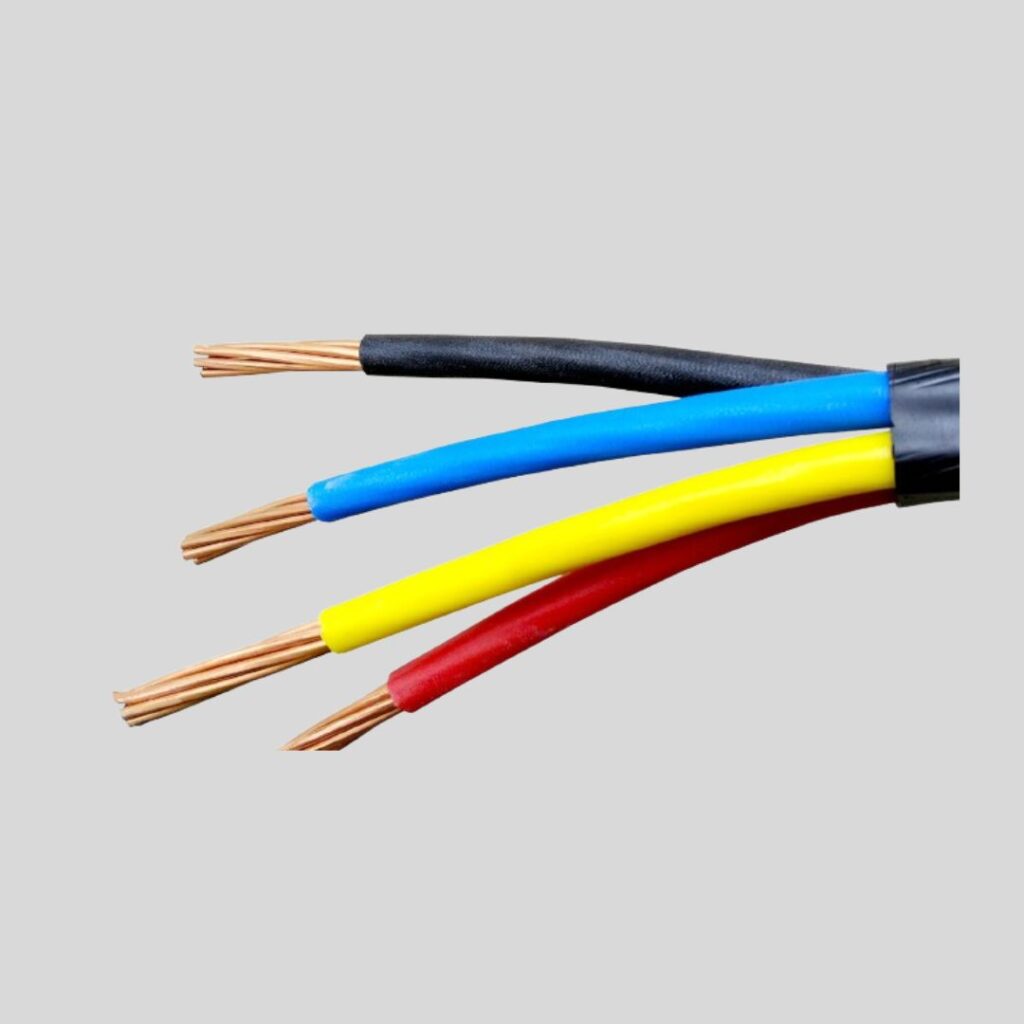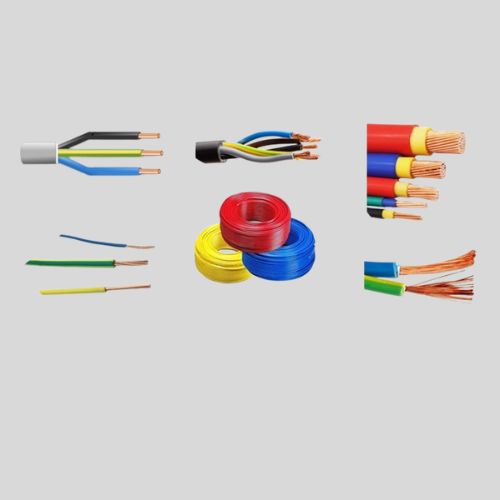Electrical Cables

Understanding Electrical Cables: The Lifeline of Power and Automation
Electrical cables are the foundation of any electrical system, as we at Rudra Power & Automation are aware. Cables are essential for carrying power and communications in everything from intricate industrial systems to household wiring. The definition of electrical cables, their various varieties, their uses, and their importance in power and automation systems will all be covered in this article.
What Are Electrical Cables?
To carry electrical energy or signals, electrical cables are made up of one or more conductors that are insulated and bundled together. Because of their superior conductivity, materials like copper and aluminium are commonly used to make the conductors. Cables can be utilised in a variety of applications since the insulation that surrounds these conductors assures safety and stops electrical leaks.
Types of Electrical Cables
It is essential to comprehend the various kinds of electrical cables in order to choose the best one for your requirements. Here are a few typical kinds:
Power Cables:
The purpose of power cables is to transport electrical energy between locations. They fall into the following categories and are commonly used in power distribution systems:
- Low Voltage Cables: These cables may carry voltages of up to 1 kV and are used in both home and business settings.
- Medium Voltage Cables: Often utilised in industrial settings, these cables are made for voltages ranging from 1 kV to 35 kV.
- High Voltage Cables: Used for voltages higher than 35 kV, these cables are crucial for long-distance electrical transmission.

Control Cables:
In automation systems, control signals are transmitted via control cables. They are frequently encountered in industrial settings where machinery and equipment need to be watched over and managed. These cables frequently have shielding to stop electromagnetic interference and may have several conductors.
Data Cables:
Data cables are extensively utilised in networking and telecommunications applications and are made expressly to carry data signals. Typical kinds include of:
- Ethernet cables come in a variety of types, including Cat5e, Cat6, and Cat7, and are used for networking and internet connectivity.
- Coaxial cables: These are made to transmit high-frequency signals and are utilised for internet and cable television connections.
- Fibre Optic Cables: Constructed from glass or plastic fibres, these cables offer high-speed, long-distance communication by sending data as light signals.
Instrumentation Cables:
Signals from sensors and instruments are sent to control systems via instrumentation cables. These cables are made to transmit data accurately and reliably, and they frequently have shielding to prevent interference.
Flexible Cables:
For applications that need mobility, like robotics or gear that moves repeatedly, flexible cables are designed. These cables are appropriate for dynamic conditions since they are made to endure twisting and bending without breaking.
Electrical Cables Brand
- Finolex
- KEI
- Polycab
Applications of Electrical Cables
Applications for electrical cables are numerous and span several industries:
Residential Wiring:
Electrical wires are necessary in homes to power outlets, lights, and appliances. For these applications, low-voltage cables are frequently utilised, guaranteeing effectiveness and safety.
Commercial Buildings:
In business environments, cables are utilised to power office equipment, HVAC systems, and lights. Data and control cables are essential components of building automation and security systems.
Industrial Settings:
Power and control cables are essential for running conveyors, machines, and other equipment in industrial settings. They guarantee dependable signal transmission and effective power distribution.
Telecommunications:
In order to provide phone and internet services, data cables are essential for telecommunications networks. For both home and business use, fibre optic cables in particular offer fast communication.
Transportation:
In many transportation systems, such as those in the railway, aviation, and automotive sectors, cables are utilised to transfer data and power systems.
Importance of Electrical Cables in Power and Automation
- Reliability: Electrical cables are made to endure a range of environmental factors, guaranteeing consistent performance over time. The chance of failure is reduced by high-quality cables, which is essential for ensuring continuous operations.
- Safety: Electrical shocks and short circuits can be avoided with properly insulated cables. Overall safety in electrical systems is improved by choosing the appropriate cable type and size for certain applications.
- Efficiency: Low resistance cables minimise energy loss during transmission, improving system performance as a whole. In large-scale industrial applications, this efficiency is especially crucial.
- Versatility: Electrical cables are adaptable solutions for a variety of industries due to their large range of cable types, which may be employed in a variety of applications.
Selecting the Right Electrical Cable
For best results, you must select the appropriate cable for your application. Here are some things to think about: Type of Application:
- For best results, you must select the appropriate cable for your application. Here are some things to think about:
- Type of Application: Determine whether the cable is being used for data transmission, control signalling, or power delivery. The kind of cable required will be determined by this.
- Current Rating: Verify the cable’s current rating to make sure it can manage the necessary current load. Every cable type has a current rating, and it is crucial for safety to choose one that either meets or surpasses the standard.
- Rating of Voltage: For your application, pick a cable with the right voltage rating. Overheating and possible failure may result from using a cable rated for a lower voltage.
- Environmental Factors: Take into account the setting for installation. Depending on the environment, several cables are made to withstand severe temperatures, chemicals, or wetness.
- Length of Run: Voltage dips may occur with longer cable lines. To reduce this effect, it is critical to determine the proper gauge or cable size.
Maintenance and Testing of Electrical Cables
To guarantee cables’ durability and functionality, routine testing and maintenance are necessary:
- Visual Inspection: Examine items visually on a regular basis for indications of corrosion, wear, or deterioration. Replace any damaged cables as soon as possible to avoid safety risks.
- Testing for Continuity: To make sure the cable is operating correctly, test for continuity using a multimeter. This testing can assist in locating cable breaks or shorts.
- Insulation Testing: Potential problems can be found early on with routine insulation testing. In industrial situations where cables are subjected to extreme circumstances, this is especially crucial.
Innovations in Electrical Cable Technology
Cable usefulness and design evolve along with technology. Among the most recent developments are:
- Low-Smoke, Zero-Halogen (LSZH) cables: It improve safety in enclosed areas like workplaces and public buildings by emitting little smoke and no halogen fumes in the event of a fire.
- Increased Durability: By using new materials and manufacturing methods, cables are becoming more resilient to environmental influences and wear.
- Smart Cables: As the Internet of Things and smart technologies grow in popularity, cables with integrated sensors that track performance and identify issues instantly are being created, increasing system dependability.
We at Rudra Power & Automation understand how important electrical cables are to the effective operation of electrical systems. You can improve safety and dependability in your operations by making well-informed judgements by being aware of their types, uses, and significance. Choosing the correct electrical cables is essential for optimum performance, whether you are designing new systems or upgrading old ones.
Please contact us if you need help choosing the right cables for your particular requirements or if you have any questions. In order to help you identify the finest solutions for your applications, our team of professionals is available to assist you in navigating the complexity of electrical components.
